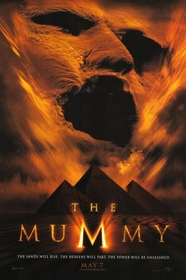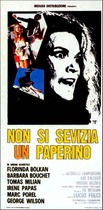Our editor-in-chief Nate Yapp is proud to have contributed to the new book Hidden Horror: A Celebration of 101 Underrated and Overlooked Fright Flicks, edited by Aaron Christensen. Another contributors include Anthony Timpone, B.J. Colangelo, Dave Alexander, Classic-Horror.com's own Robert C. Ring and John W. Bowen. Pick up a copy today from Amazon.com!
The Mummy (1999)
Whenever writer/director Stephen Sommers starts talking about his great love and respect for the classic Universal monster movies, I have to wonder if he's watching the same films as I did growing up. After seeing the The Mummy, The Mummy Returns, and Van Helsing, it's clear that he is more fond of the slightly goofier fare of the 1940s than the thoughtful horrors of the 1930s. Mind you, this isn't necessarily a bad thing, it's just that one wishes that Sommers would be clearer about his intent. Taken as pure summer fare, and not as a direct remake of any sort, Sommers' 1999 version of The Mummy is a complete waste of time -- which is exactly what it strives to be.
So, this Imhotep fellow (Arnold Vosloo) did some bad things in the name of love about 3000 years ago, and, as punishment, he was sentenced to the most tortuous death imaginable. One catch, however, is that if he's ever resurrected, he becomes incredibly powerful. Obviously, this is the most brilliant torture ever devised. Anyway, cut ahead to 1920s Egypt where we meet our heroes -- rugged Rick O'Connell (Brendan Fraser), bubble-headed scholar Evelyn Carnahan (Rachel Weisz), and her ne'er-do-well brother Jonathan (John Hannah). Through circumstance and enthusiasm, they awaken Imhotep, who works to bring about the end of the world with a series of nasty computer-generated plagues.
The plot resembles a jokey Indiana Jones film more than it does any mummy film ever made. However, comparisons to Spielberg's legendary adventure trilogy leave The Mummy looking weak. The biggest divide is one of character -- the Indiana Jones films have real flesh-and-blood people with backstories and motivations. The Mummy hands out only faint, ephemeral clues about why the people are doing what they're doing, and sometimes we don't even get that. Sommers' original script was beefier on the character development, but most of that material is gone, likely stripped out to keep the movie's running time in check. The omissions divest the characters of those details vital to developing fully functional personalities, and they instead create a series of caricatures.
Still, relating to characters is not a necessary component of being amused by them, and that is apparently Sommers' primary goal here. There is something to be said for a film that removes the necessity of real thought from the viewing process, and then presents nothing but good-natured showmanship in return. Often, The Mummy plays like the family matinee version of Sam Raimi's Army of Darkness, with Fraser as a more affable Bruce Campbell. Of course, the obviously massive budget belies this comparison somewhat, but the influence is definitely there (and it would only increase in the sequel, The Mummy Returns).
Bearing that in mind, however, The Mummy could stand to be trimmed. Most of the major setpieces last twice as long as necessary, especially since the impressive-for-the-time computer effects maintain a plastic sheen of fakery that a more aware director might worked around with carefully applied editing. Sommers, however, loves his pixels and takes great relish in showing them off, no matter how fake they may appear to the trained eye. This dates the film badly, even though it's only been a decade since its release.
Then again, you could do worse. Perhaps that's not the cheeriest of compliments, but this is a film that does not strive for greatness, or even to be terribly good at what it is. It swims, quite happily, in the pond of mediocrity. There are times when good is too much and bad is too infuriating, where we just want something that... is. The Mummy fills that niche.








